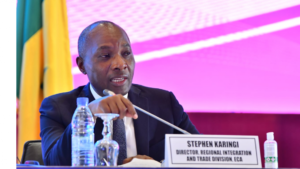Regional integration key in transforming Africa’s fragmented economies – Karingi

Regional integration remains the key to transforming Africa’s fragmented economies, says Stephen Karingi, Director, Regional Integration and Trade Division of the UN Economic Commission for Africa.
African countries should therefore harness opportunities embedded in integration initiatives like the African Continental Free Trade Area (AfCFTA) to foster post-Covid19 economic recovery and transformation.
Mr Karingi made the remarks while presenting an assessment of progress on regional integration in Africa at the Expert Group Meeting during the ongoing 54th session of the Conference of African Ministers of Finance, Planning and Economic Development (CoM2022) in Dakar, Senegal.
He said that although commendable progress has been made in advancing integration agendas, challenges remained.
“On trade integration, progress has been made in boosting intra –African trade like adoption of industrialization policies and strategies. But Africa continues to trade more with the outside world than with itself,” noted Mr Karingi
The ECA director noted that macroeconomic integration and convergence was essential to accelerating intra-regional trade. Five Regional Economic Communities (COMESA, EAC, ECCAS, ECOWAS, and SADC) already have primary macroeconomic convergence criteria.
But “Africa’s integration and socioeconomic development is impeded by huge infrastructure gaps. Production integration on the continent remains uneven and weak” he added.
During the meeting delegates from Egypt, Namibia, Burkina Faso and Benin raised their concerns on how slowly the continent was integrating and how prepared the continent was in addressing the aftermath of Covid19 and the Ukraine crisis.
A delegate from Egypt asked how the Ukraine crisis had affected commodity prices for goods like wheat and fertilizer and whether African countries could unify their efforts in the international market.
Mr Karingi acknowledged that the Ukraine crisis had led to an increase in the price of fertilizer. One suggestion was that countries like Morocco, Kenya and Algeria could accept fertilizer orders from the other African countries and offer competitive prices for the purchases.
On why African countries are still competing with each other when they are expected to integrate since the launch of AfCFTA — a question raised by a delegate from Namibia — Mr Karingi said that the integration process was being hindered by difficulties with infrastructure, financing and policy issues like rules of origin that are a challenge for a common open market.
“The solutions Africa comes up with should outlive the current shocks the continent is going through and deal with future challenges. Political will should be dealt with and dialogue within countries (should be encouraged)” said Mr Karingi.
Mr Karingi said a concerted effort was required from all the RECs, key partners and stakeholders to tackle integration challenges.”
African countries, he said, should implement the AfCFTA to strengthen resilience of African countries to withstand future economic shocks and maintain sustainable growth in the post Covid 19 era.
Mr Karingi said the ECA would continue to support member states, RECs, the AUC and the AfCFTA secretariat in the implementation of the agreement and other integration frameworks such as BIATS, FMPs protocol; and would continue to provide technical support including for ARIA X and AfCFTA-RECs interface reports.
Source: ECA
